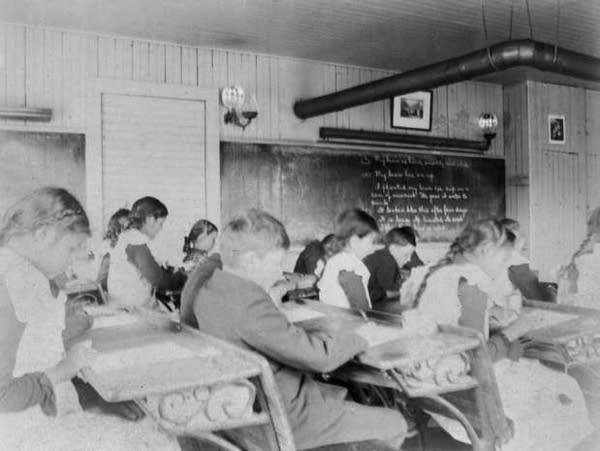Search for Indian boarding school records gets a boost

Go Deeper.
Create an account or log in to save stories.
Like this?
Thanks for liking this story! We have added it to a list of your favorite stories.
The U.S. Department of the Interior and the Minnesota-based Native American Boarding School Healing Coalition have signed an agreement to collaborate in the search for records of Indian boarding schools.
The goal is to establish an online archive of the records starting late next year, so families can access them.
A memorandum of understanding will allow for the sharing of records and information in support of the Federal Indian Boarding School Initiative, which was announced earlier this year.
The Minnesota-based coalition started working on the issue nearly a decade ago. This agreement marks a shift in the federal response.
Turn Up Your Support
MPR News helps you turn down the noise and build shared understanding. Turn up your support for this public resource and keep trusted journalism accessible to all.
“We had asked the federal government back in 2016 through a FOIA request to answer how many boarding schools the U.S. had, how many children went to those schools, from which tribal nations they went, and how many died or went missing,” said the coalition’s CEO Christine Diindiisi McCleave. “They weren't able to answer our questions. So what's unique about this initiative is that the federal government is now putting some resources into researching their records.”
“The first step to healing is acknowledging the painful truths of federal boarding school policies and gaining a fuller understanding of their impacts,” said Interior Secretary Deb Haaland in announcing the agreement on Tuesday.

“Today’s action will help strengthen our efforts to gather necessary information and records so that we can unravel the threads of trauma that linger in Indigenous communities.”
The Native American Boarding School Healing Coalition has identified 367 Indian boarding schools. Some of the records from those schools are in the National Archive, but others proved difficult for the nonprofit to access, with some organizations refusing access to records.
“We found that some of them were held in church archives, universities or private collections, so access to those records is still an issue,” said McCleave. “But this investigation that has been launched by the Interior Department means that they are looking into records that are not at the National Archives, so they're opening new collections of records that were not previously accessible.”
The limited access to records means some families have been unable to learn what happened to children who went to boarding schools and never returned.
“The records are a central point, it's part of the truth telling that has to happen for us to know what the experiences were, what the impacts were of these policies,” said McCleave, who is also pushing for a commission to gather stories about boarding school experiences as part of a search for truth.
For more than 150 years, Indigenous children were forcibly relocated to residential facilities. The purpose was cultural assimilation by forcibly suppressing native language, culture and identity. The Department of the Interior estimates that hundreds of thousands of children were taken from families under the government policy.
Establishing a record for all of those children will be a time-consuming, challenging task.
“What we're aiming to do is to publish a digital archive, meaning that we will scan these records and make them available on the internet,” said McCleave. “It will take some time. But we're planning to launch the first collection of our digital archives in the fall of 2022.”



